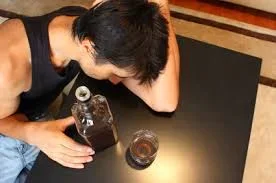Nelson Vergel
Founder, ExcelMale.com

Abstract
To determine whether ethanol per se affects testosterone metabolism, alcohol was administered to normal male volunteers for periods up to four weeks, resulting in an initial dampening of the episodic bursts of testosterone secretion followed by decreases in both the mean plasma concentration and the production rate of testosterone. The volunteers received adequate nutrition and none lost weight during the study, which tended to exclude a nutritional disturbance as the cause of the decreased testosterone levels. The changes in plasma luteinizing hormone suggested both a central (hypothalamus-pituitary) and gonadal effect of alcohol. In addition, alcohol consumption increased the metabolic clearance rate of testosterone in most subjects studied, probably owing to the combined effects of a decreased plasma binding capacity for the androgen and increased hepatic testosterone A-ring reductase activity. These results indicate that alcohol markedly affects testosterone metabolism independently of cirrhosis or nutritional factors.
Source: N Engl J Med 295:793–797, 1976
**************************************
Abstract:
Background:
Moderate alcohol consumption is inversely associated with cardiovascular diseases. Changes in hormone levels might in part help explain the positive health effect. This study was performed to examine the effect of moderate alcohol consumption on plasma dehydroepiandrosterone sulfate (DHEAS), testosterone, and estradiol levels.
Methods: In a randomized, diet-controlled, crossover study, 10 middle-aged men and 9 postmenopausal women, all apparently healthy, nonsmoking, and moderate alcohol drinkers, consumed beer or no-alcohol beer with dinner during two successive periods of 3 weeks. During the beer period, alcohol intake equaled 40 and 30 g per day for men and women, respectively. The total diet was supplied and had essentially the same composition during these 6 weeks. Before each treatment there was a 1 week washout period, in which the subjects were not allowed to drink alcoholic beverages. At the end of each of the two experimental periods, fasting blood samples were collected in the morning.
Results: Moderate alcohol consumption increased plasma DHEAS level by 16.5% (95% confidence interval, 8.0–24.9), with similar changes for men and women. Plasma testosterone level decreased in men by 6.8% (95% confidence interval, −1.0–−12.5), but no effect was found in women. Plasma estradiol level was not affected. Serum high-density lipoprotein cholesterol level increased by 11.7% (95% confidence interval, 7.3–16.0), with similar changes for men and women. The overall alcohol-induced relative changes in DHEAS, testosterone, and estradiol correlated positively with the relative increase in high-density lipoprotein cholesterol (adjusted for the relative change in body weight); however, findings were only borderline significant for DHEAS and estradiol (r= 0.44, p= 0.08; r= 0.32, p= 0.21; and r= 0.46, p= 0.06, respectively).
Source: Alcoholism: Clinical and Experimental Research
Volume 28, Issue 5, pages 780–785, May 2004













